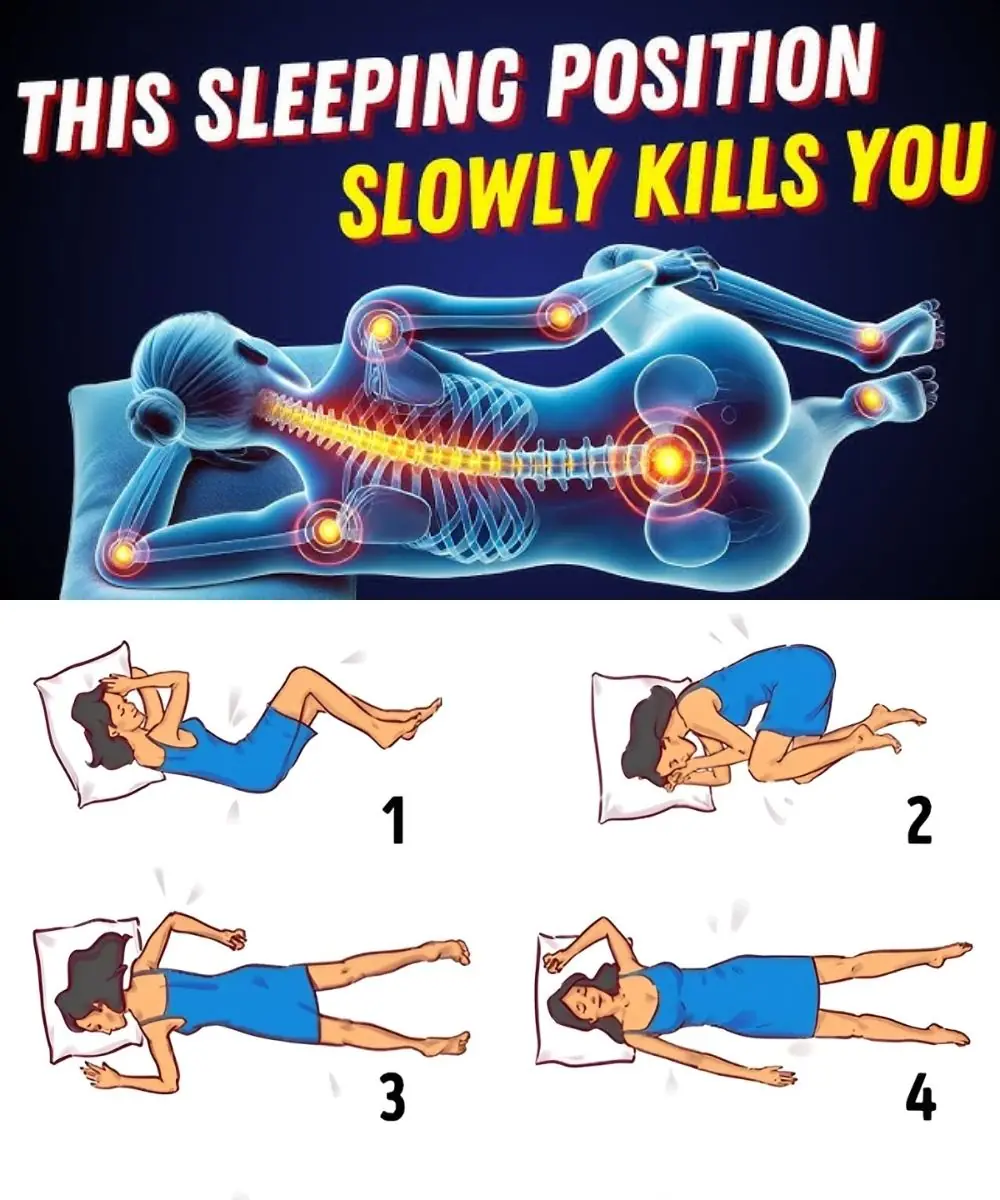
What if the way you’re sleeping is quietly harming your body? Sleep is your body’s time to heal, recharge, and prepare for the day ahead, but the wrong sleeping position can turn this restorative process into a health hazard. From back pain to breathing issues, your bedtime posture could be working against you—night after night.
In this article, we’ll uncover the most dangerous sleeping position, reveal the surprising risks it poses, and share science-backed strategies to help you sleep smarter, safer, and better. Get ready to rethink your nightly routine and wake up feeling refreshed, pain-free, and energized. Let’s dive in!
🧠 Why Your Sleeping Position Matters
Sleep isn’t just about closing your eyes—it’s about giving your body the right conditions to repair and thrive. Your sleeping posture directly impacts your spine, joints, breathing, and even digestion. The wrong position can lead to chronic pain, poor sleep quality, and serious health risks over time. By choosing a posture that supports your body’s natural alignment, you can transform your rest and supercharge your well-being.
The Science of Sleep Posture
Research shows that improper sleeping positions can strain muscles, compress nerves, and disrupt breathing. This not only leaves you tired and achy but can also increase the risk of conditions like sleep apnea and acid reflux. The good news? Small changes to your sleep habits can make a massive difference. Let’s explore the position you should avoid and why.
🛑 The Most Dangerous Sleeping Position: On Your Back
Lying flat on your back might feel natural or even luxurious, but for many, it’s the least healthy way to sleep. While it seems harmless, this position can wreak havoc on your body—especially if you have certain health conditions. Here’s why sleeping on your back can be a silent threat:
😴 Increased Risk of Sleep Apnea
When you lie on your back, gravity pulls your tongue and soft tissues toward your throat, potentially blocking your airway. This can lead to snoring, interrupted breathing, and poor sleep quality. For those with sleep apnea, this position can worsen symptoms, leaving you fatigued and at higher risk for heart issues.
Who’s at Risk? People with sleep apnea, obesity, or a history of snoring should avoid back sleeping.
🦴 Spinal Strain and Morning Pain
Sleeping flat on your back can misalign your spine, especially if your mattress is too soft or firm. This puts pressure on your lower back, neck, and shoulders, leading to stiffness or pain when you wake up. Over time, this strain can contribute to chronic back issues.
The Fix: A supportive mattress and proper pillow can help, but other positions may be safer.
🔥 Worsened Acid Reflux
If you have acid reflux or GERD, lying on your back allows stomach acid to flow into your esophagus, intensifying heartburn and discomfort. This can disrupt sleep and damage your esophagus over time.
Quick Tip: Elevating your head slightly or switching positions can reduce reflux symptoms.
🚨 Other Risky Sleeping Positions to Watch For
While back sleeping tops the list of risky postures, other common positions can also harm your health if done incorrectly. Here’s what to avoid and why:
🤗 Overly Tight Fetal Position
Curling up into a tight fetal ball feels cozy, but it can compress your spine, restrict breathing, and strain your neck, shoulders, and hips. This position limits lung expansion and can lead to morning stiffness.
Better Way: Loosen the curl, keeping your spine relaxed and knees slightly bent.
🛌 Sleeping on One Side Only
Side sleeping is often recommended, but always favoring the same side can cause muscle imbalances, shoulder pain, or hip discomfort. Without proper support, this habit can lead to joint issues over time.
Solution: Switch sides regularly and use a supportive mattress to distribute pressure evenly.
💑 Spooning Position
Spooning with a partner is romantic, but it often forces your spine into unnatural curves, causing hip strain and shoulder discomfort. Prolonged spooning can also lead to numbness or tingling in your arms.
Compromise: Enjoy brief cuddling, then shift to a neutral position for deeper sleep.
🌟 Healthier Sleeping Positions for Better Rest
Ready to sleep smarter? These science-backed positions promote spinal alignment, better breathing, and pain-free mornings:
🛏️ Side Sleeping with Support
Side sleeping is one of the healthiest positions, especially for those with sleep apnea or acid reflux. It keeps your airway open and reduces pressure on your spine.
How to Do It Right: Use a firm pillow to align your head and neck with your spine. Place a pillow between your knees to keep your hips neutral. Switch sides to avoid imbalances.
Pro Tip: A medium-firm mattress supports side sleepers best.
🌜 Gentle Fetal Position
A relaxed fetal position—with a slight curve in your spine and knees loosely bent—supports your back and promotes comfort without restricting breathing.
Key Tip: Avoid tucking your chin or pulling your knees too close to your chest to prevent strain.
🛌 Back Sleeping with Modifications
If you prefer back sleeping, make it safer by placing a pillow under your knees to maintain your spine’s natural curve. Elevate your head slightly with a thin pillow to reduce reflux or snoring.
Who Benefits? This modified position works for those without sleep apnea or reflux issues.
🛋️ Sleep Hacks to Boost Comfort and Health
Your sleeping position is only part of the equation. These practical tips will optimize your rest and protect your body:
🛏️ Invest in the Right Mattress
A medium-firm mattress provides the best balance of comfort and support, keeping your spine aligned in any position. Avoid overly soft beds that cause sagging or overly firm ones that create pressure points.
Quick Check: Replace your mattress every 7–10 years for optimal support.
⏰ Stick to a Consistent Sleep Schedule
Going to bed and waking up at the same time daily regulates your body’s internal clock, promoting deeper, more restorative sleep. Aim for 7–9 hours per night.
Try This: Set a bedtime alarm to remind you to wind down.
🍽️ Avoid Late-Night Meals
Eating too close to bedtime can trigger acid reflux and disrupt sleep. Finish your last meal 2–3 hours before bed to give your digestive system a break.
Smart Swap: If you’re hungry, opt for a light snack like a banana or a handful of nuts.
🧘 Practice Relaxation Before Bed
Stress and tension can cause you to clench muscles or sleep in awkward positions. Try deep breathing, stretching, or a 5-minute meditation to relax your body and mind.
Easy Hack: Use a guided sleep meditation app to ease into rest.
🛠️ Optimize Your Sleep Setup
Small tweaks can make a big difference:
Use a pillow that supports your neck’s natural curve.
Keep your bedroom cool (60–67°F) and dark for better sleep quality.
Consider a body pillow for extra support, especially for side sleepers.
💡 Why This Matters to You
Your sleeping position shapes how you feel every day. The wrong posture can leave you tired, sore, and at risk for long-term health issues. By making simple adjustments, you can wake up refreshed, pain-free, and ready to conquer your day. Imagine starting each morning with energy, focus, and a body that feels strong and balanced.
The Emotional Payoff
Picture yourself sleeping deeply, free from tossing and turning. Envision waking up without back pain, neck stiffness, or grogginess. By choosing a healthier sleeping position, you’re investing in better health, sharper focus, and a happier you.
🥗 Your Action Plan for Better Sleep
Ready to transform your sleep? Here’s a simple plan to get started:
Assess Your Position: Identify your current sleeping posture and note any morning pain or discomfort.
Try Side Sleeping: Experiment with side sleeping, using a pillow between your knees and a firm pillow for your head.
Upgrade Your Bed: Check your mattress for sagging and ensure it’s medium-firm for optimal support.
Set a Sleep Routine: Go to bed and wake up at the same time daily to regulate your body clock.
Avoid Back Sleeping Risks: If you must sleep on your back, add a pillow under your knees and elevate your head slightly.
Wind Down: Incorporate a 5-minute relaxation ritual before bed to reduce tension.
✨ The Final Word: Sleep Smarter, Live Better
The way you sleep is more than a habit—it’s a powerful choice that shapes your health. Sleeping on your back may seem harmless, but it can silently harm your body over time. By choosing a position that supports your spine, enhances breathing, and reduces strain, you can unlock deeper, more restorative sleep.
Start tonight. Adjust your pillow, try a new position, or invest in a better mattress. These small changes can lead to big rewards: more energy, less pain, and a body that feels revitalized. Sleep smart, sleep safe, and wake up ready to thrive.







































